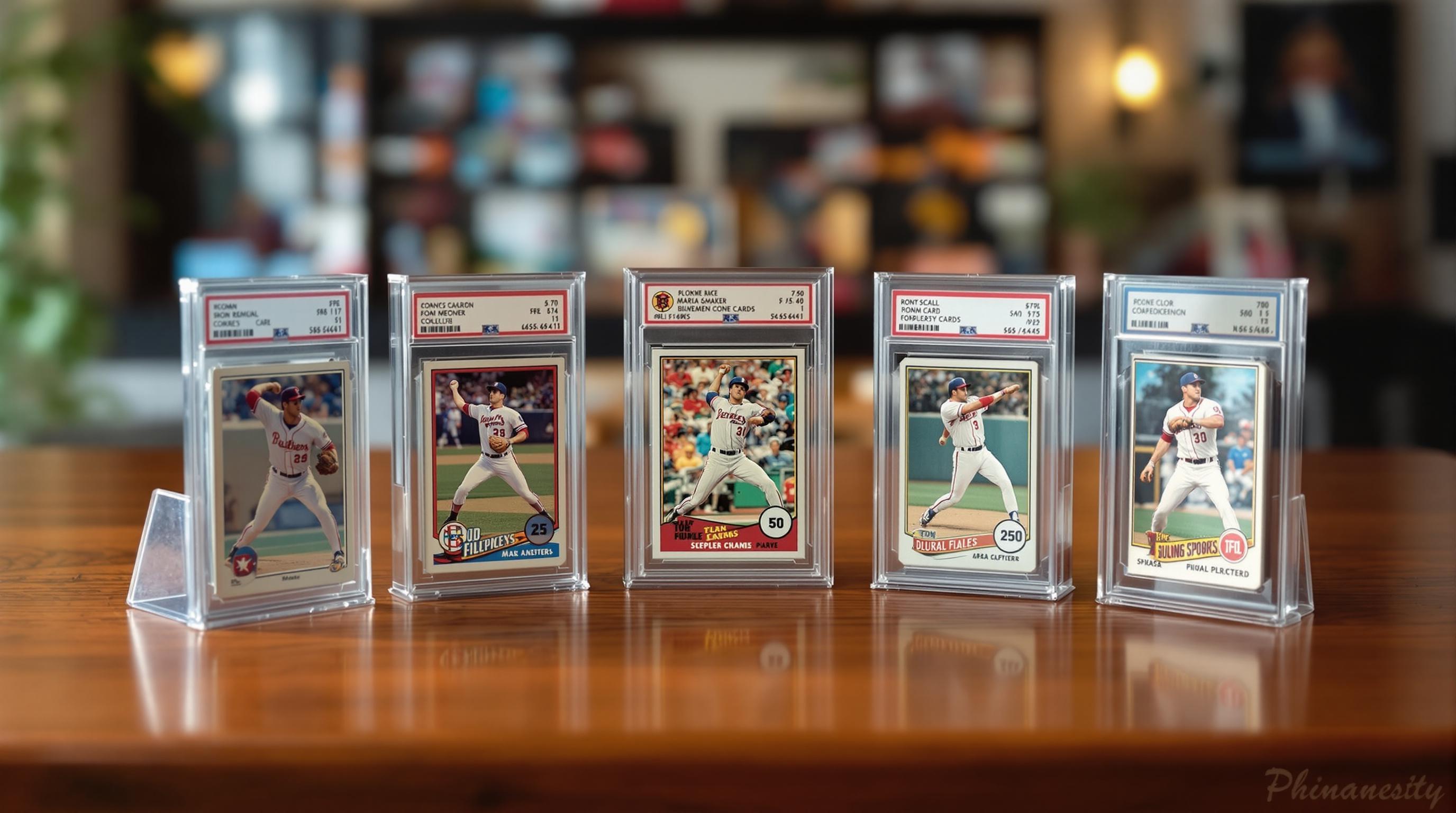MVP awards can significantly impact trading card prices, offering both short-term spikes and long-term growth opportunities for collectors. Timing is critical - off-season dips often present buying opportunities, while MVP wins and career milestones drive value increases. Here's what you need to know:
-
Key Drivers of Value:
- Performance metrics during the season.
- Award recognition, including MVP wins and playoff success.
- Fan engagement and player popularity.
-
Timing Strategies:
- Off-season: Prices drop, ideal for buying.
- Regular season: Gradual increases; track player stats.
- Post-MVP award: Immediate spikes; consider selling.
- Career milestones: Sustain long-term value.
-
Examples:
- LeBron James: Consistent value growth tied to MVP seasons and career achievements.
- Shohei Ohtani: Unique dual-role success as a pitcher and hitter boosts his cards' appeal year-round.
Pro Tip: Focus on rare, high-grade cards and use tools like grading services to maximize your investments. Stay informed on player stats, injuries, and team dynamics to navigate the market effectively.
Topps MVP Buyback 2024: The Best Cards to Invest In Now!
How MVP Awards Affect Card Values
MVP awards have a noticeable impact on trading card values, influenced by several key market dynamics. When a player earns MVP recognition, their card values often see both immediate and lasting changes.
As mentioned earlier, card values tend to follow seasonal trends: they rise during the regular season and drop during the off-season. This off-season dip can be a smart time for collectors to buy, even for MVP recipients [1].
Here are three main factors that shape MVP-driven card value trends:
- Performance Metrics: Strong in-season performances boost MVP chances and lead to price increases [1].
- Award Recognition: Achievements like MVP wins and playoff success often cause sustained growth in card values [1].
- Fan Engagement: Players with larger, more devoted fan bases typically see sharper value increases in their cards after an MVP win.
| Timing | Market Behavior | Strategic Consideration |
|---|---|---|
| Pre-season | Values rise for MVP candidates | Identify potential MVP contenders |
| Regular Season | Gradual increases based on performance | Track player stats and monitor injuries |
| Post MVP Award | Immediate spike in card values | Evaluate selling opportunities |
| Off-season | Natural dip in values | Consider buying at lower prices |
For collectors aiming to profit from MVP-related value changes, timing is everything. Researching player stats, tracking injuries, and analyzing career trajectories can help identify promising investments [1].
Notably, the impact of MVP awards on card values doesn’t stop with the award itself. Post-season success and continued strong performance often maintain or even boost card values further [1]. Collectors who can predict MVP candidates early in the season are better positioned to take advantage of these trends.
This pattern is clearly seen in the trading card markets of stars like LeBron James and Shohei Ohtani, where MVP seasons have had a huge influence on card values.
1. LeBron James Card Value Trends
LeBron James' MVP seasons have a noticeable impact on the value of his trading cards. Like other MVP winners, his card prices usually drop during the off-season, creating opportunities for buyers, and surge during MVP seasons or major career achievements [1].
High-end cards, such as rookie or autographed editions, typically see the biggest value increases following MVP wins [1]. This makes timing a key factor for collectors aiming to maximize their investments.
Here's a breakdown of how timing and market factors influence investment strategies for LeBron James cards:
| Investment Timing | Market Factors | Strategic Approach |
|---|---|---|
| Off-season | Lower prices, quieter market activity | Buy and hold for the long term |
| Pre-MVP Season | Improving performance indicators | Monitor trends closely |
| Post-MVP Award | High market demand | Sell during peak interest |
| Career Milestones | Steady value appreciation | Prioritize rare, high-grade cards |
LeBron's consistent track record and career milestones make his cards a solid choice for collectors who keep an eye on stats and market trends [1]. To get the most out of investing in his cards, focus on:
- Monitoring season stats and team performance
- Anticipating upcoming career milestones
- Analyzing overall market conditions
LeBron's MVP seasons not only highlight his dominance on the court but also reinforce his trading cards as a dependable long-term investment [1]. His career excellence has set a high standard for how MVP recognition can drive card value.
That said, Shohei Ohtani's unique dual-role success offers an interesting contrast, showcasing how MVP awards can shape card markets in different ways.
sbb-itb-0db97a5
2. Shohei Ohtani Card Value Trends
Shohei Ohtani's rare ability to excel as both a pitcher and hitter makes his cards a standout in the MVP-driven market. This dual-role success keeps collectors interested throughout the year, with noticeable value jumps tied to his achievements in both pitching and hitting [1].
Timing is everything when it comes to investing in Ohtani's cards. Several factors influence their value:
| Market Phase | Value Trend | Investment Focus |
|---|---|---|
| Regular Season | Performance-based growth | Achievements in both roles |
| Career Milestones | Higher premiums | Rare, high-grade cards |
| Injury Periods | Adjusted prices | Long-term potential |
High-grade Ohtani cards experience the biggest value increases after MVP wins [1]. His status as a two-way player offers multiple ways for his card values to rise, making them stand out compared to traditional MVP winners. Even during slower market periods, his cards often retain stronger value [1].
When considering Ohtani card investments, keep these factors in mind:
- Performance in both pitching and hitting
- Proximity to major career milestones
- Team performance and its influence on his visibility
- Rarity and condition of the card
Ohtani's success as a dual-role player not only boosts his market appeal but also shows how unique player profiles can have a bigger impact on card values. His unmatched combination of skills continues to reshape the usual MVP-driven market trends, giving collectors exciting opportunities that differ from single-position stars like LeBron James [1].
Pros and Cons of Investing in MVP Winners' Cards
Investing in MVP winners' cards comes with both opportunities and challenges, making it essential for collectors to weigh their options carefully. Timing and staying informed are key factors in navigating this market.
| Aspect | Advantages | Disadvantages |
|---|---|---|
| Value Growth | • Immediate value increases during key moments in the season • Long-term potential for appreciation |
• Higher prices during peak hype periods • Risk of market oversupply |
| Market Timing | • Opportunities to buy at lower prices during the off-season • Multiple events can drive value spikes |
• High price swings during the regular season • Requires constant market monitoring |
| Risk Factors | • Proven performance history of MVP players • Easier to sell due to higher demand |
• Injuries can quickly hurt value • Dependent on team performance |
Timing plays a crucial role. Off-season dips often offer a chance to buy at lower prices, while the regular season's unpredictability demands close attention to trends and events [1]. While injuries and team performance can pose risks, collectors can reduce these by staying informed and doing thorough research.
Key Tips for Success:
- Study player trends: Look at recent performance and career trajectory.
- Follow team dynamics: A strong team can boost a player's card value.
- Check card rarity and condition: Scarcity and quality significantly impact value.
Specialized platforms that provide grading and authentication services can help maximize the worth of your cards. For example, LeBron James' consistent excellence and Shohei Ohtani's unique dual-role success illustrate how these factors influence card values in practice [1].
Market Factors to Watch:
- Performance during the season can cause immediate price shifts [1].
- Playoff appearances often act as additional value drivers [1].
- Media coverage plays a big role in shaping market sentiment.
- External events can quickly influence card prices.
Conclusion
The link between MVP awards and trading card values presents a chance for collectors to make smarter investment decisions. Knowing when to buy and sell - especially during the off-season - can make a big difference in returns.
Here are a few strategies collectors can use to get the most out of MVP-caliber cards:
- Buy During Off-Season: Look for price drops in the off-season to snag cards of reliable performers at lower costs.
- Track Player Performance: Keep an eye on in-season stats and team dynamics to spot players with MVP potential.
- Do Your Homework: Use trusted platforms to check card authenticity and current market prices.
Examples like LeBron James and Shohei Ohtani highlight the importance of working with reputable dealers and using dependable tools. Platforms like Card Shops List connect collectors with verified sellers who specialize in sports cards and memorabilia. They also offer services like grading and authentication, which are key to safeguarding your investments.
For a better shot at success, combine short-term opportunities with long-term growth strategies. A data-backed approach, paired with solid market research and reliable authentication, can help you navigate the MVP card market with confidence.
FAQs
What year is Jokic's rookie card?
Nikola Jokic's rookie card comes from the 2015-16 Panini Prizm set, specifically card #335. Its popularity soared after Jokic won back-to-back MVP awards in 2021 and 2022. When buying high-value rookie cards like this, confirming the card's authenticity is essential.
Platforms like Card Shops List help collectors connect with reliable sellers and find fair prices for sought-after cards, including Jokic's.
"Off-season dips are common and present buying opportunities for collectors. These dips are followed by pre-season spikes if the player is expected to perform well in the upcoming season" [1]
Jokic's rookie card is a prime example of how MVP honors can drive up a card's value. This trend mirrors what has been seen with other MVP players, such as LeBron James and Shohei Ohtani. Knowing about key rookie cards like Jokic's can give collectors an edge in navigating the market shifts tied to MVP recognition.


